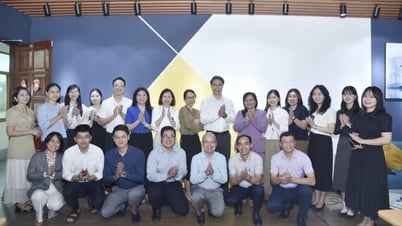According toeducation experts, the younger generation must be willing to experiment and adapt to changes in the digital age.
Digitalization, moving to adapt
Prof. Dr. Nguyen Lan Dung
 |
| Prof. Dr. Nguyen Lan Dung. |
For the younger generation to reach their full potential, education needs to adapt to technological and social developments. The digital age offers many opportunities for development, but also many challenges for education and the development of skills for the younger generation.
The rapid development of technology has made students dependent on electronic devices, leading to a lack of independent problem-solving skills or critical thinking. In addition, they have difficulty developing social skills. Online learning and communication mainly through screens can limit the development of communication skills, teamwork and the ability to perceive body language.
To overcome difficulties, students need to develop self-study habits. Develop time management and self-study skills through online educational platforms. Schools need to include subjects on social skills, communication skills, and teamwork in the curriculum so that students can develop more fully soft skills. In addition, it is necessary to help children understand the risks of the online world and equip them with information security skills and how to protect their privacy.
Encourage students to participate in extracurricular activities, research projects or practical exercises to enhance creativity and critical thinking. By combining technical knowledge and soft skills development, the younger generation can overcome the challenges of the digital age and succeed in an increasingly digital world.
In today’s digital environment, the younger generation needs to be equipped with a number of important skills to be able to develop sustainably and successfully. Understanding and being able to use information technology tools, software, and applications is an important foundation. The ability to solve problems creatively and effectively also helps the younger generation adapt to rapid changes, improve processes, and come up with new solutions. Online communication skills, especially in a multinational working environment, are very important for effective collaboration and work.
Young people need to be creative to develop new ideas and innovative to solve complex problems. With the pace of change in technology, continuous learning and updating of knowledge is essential to stay competitive and develop professionally.
Meanwhile, critical thinking skills help the younger generation analyze information, make correct assessments and make informed decisions in a digital environment full of fake and inaccurate information. In addition, skills such as time management, information security, data management, and the ability to adapt to change are also extremely important.
In a constantly changing digital world, the ability to quickly and flexibly adapt to new technologies and trends is essential. These skills not only help the younger generation develop their careers, but also contribute to sustainable development in a digital society, helping to maintain a competitive advantage and create new opportunities in the future.
To not get "stuck" in the virtual world
Assoc. Prof. Dr. Tran Thanh Nam, (Vice Principal of University of Education, VNU)
 |
| Assoc. Prof. Dr. Tran Thanh Nam. |
The current generation of young people has an open mind, is willing to experiment and adapt to changes. They are not afraid to break old rules to create new things. That is the premise for new creativity and experimentation of young people. Young people today are living in an era where the real world and the virtual world exist in parallel. Thanks to technology, young people can easily create global networks to seek opportunities for cooperation and build relationships to develop their careers while still in school.
The major challenges facing young people today are information overload and the difficulty in filtering. The huge amount of information on the Internet makes it difficult to distinguish between reliable sources and false information. This can lead to confusion and a tendency to absorb fast knowledge, “instant noodle” knowledge, junk knowledge and inaccurate knowledge.
Excessive use of technology can lead to dependence and addiction to social media, internet, and online gaming. The keyword “brain rot” is considered the word of the year 2024, which clearly shows the effects of internet addiction and excessive junk browsing leading to cognitive decline, difficulty in concentrating, reduced memory, ability to process information, difficulty in forming deep and meaningful thoughts, disorientation leading to poor decision-making ability.
As geographical boundaries are blurred by technology, the young generation of Vietnam is having to compete not only with their peers in the country but also with talented young people around the world. This can lead to stress and psychological pressure regarding future job positions and the risk of falling behind and becoming unemployed while still in the working age.
It must be affirmed that, being called the “digital citizen generation”, today’s youth’s ability to absorb technology and adapt to digital transformation is very fast. They easily get acquainted with artificial intelligence (AI) tools, new software and technology trends. This helps them effectively utilize the latest learning support tools. However, they need “lighthouses” to guide them so as not to get lost in the “sea of information” and not to get stuck in the virtual world and forget the real world. Those are the new “teachers” in the digital age.
It can be said that the current labor market highly values critical thinking and the ability to solve complex problems; adapt to the rapid changes of the labor market, creativity and social collaboration. Today's young generation needs to be aware and practice to soon possess important skills, ensuring a successful career. Of course, besides skills, moral qualities and social responsibility are always the fundamental factors for your success to be sustainable.
Source


![[Photo] President Luong Cuong presents the 40-year Party membership badge to Chief of the Office of the President Le Khanh Hai](https://vphoto.vietnam.vn/thumb/1200x675/vietnam/resource/IMAGE/2025/5/19/a22bc55dd7bf4a2ab7e3958d32282c15)
![[Photo] Prime Minister Pham Minh Chinh inspects the progress of the National Exhibition and Fair Center project](https://vphoto.vietnam.vn/thumb/1200x675/vietnam/resource/IMAGE/2025/5/19/35189ac8807140d897ad2b7d2583fbae)



![[Photo] General Secretary To Lam attends the conference to review 10 years of implementing Directive No. 05 of the Politburo and evaluate the results of implementing Regulation No. 09 of the Central Public Security Party Committee.](https://vphoto.vietnam.vn/thumb/1200x675/vietnam/resource/IMAGE/2025/5/19/2f44458c655a4403acd7929dbbfa5039)













































































![[VIDEO] - Enhancing the value of Quang Nam OCOP products through trade connections](https://vphoto.vietnam.vn/thumb/402x226/vietnam/resource/IMAGE/2025/5/17/5be5b5fff1f14914986fad159097a677)





Comment (0)